10 Ways To Feel Full While Eating Less
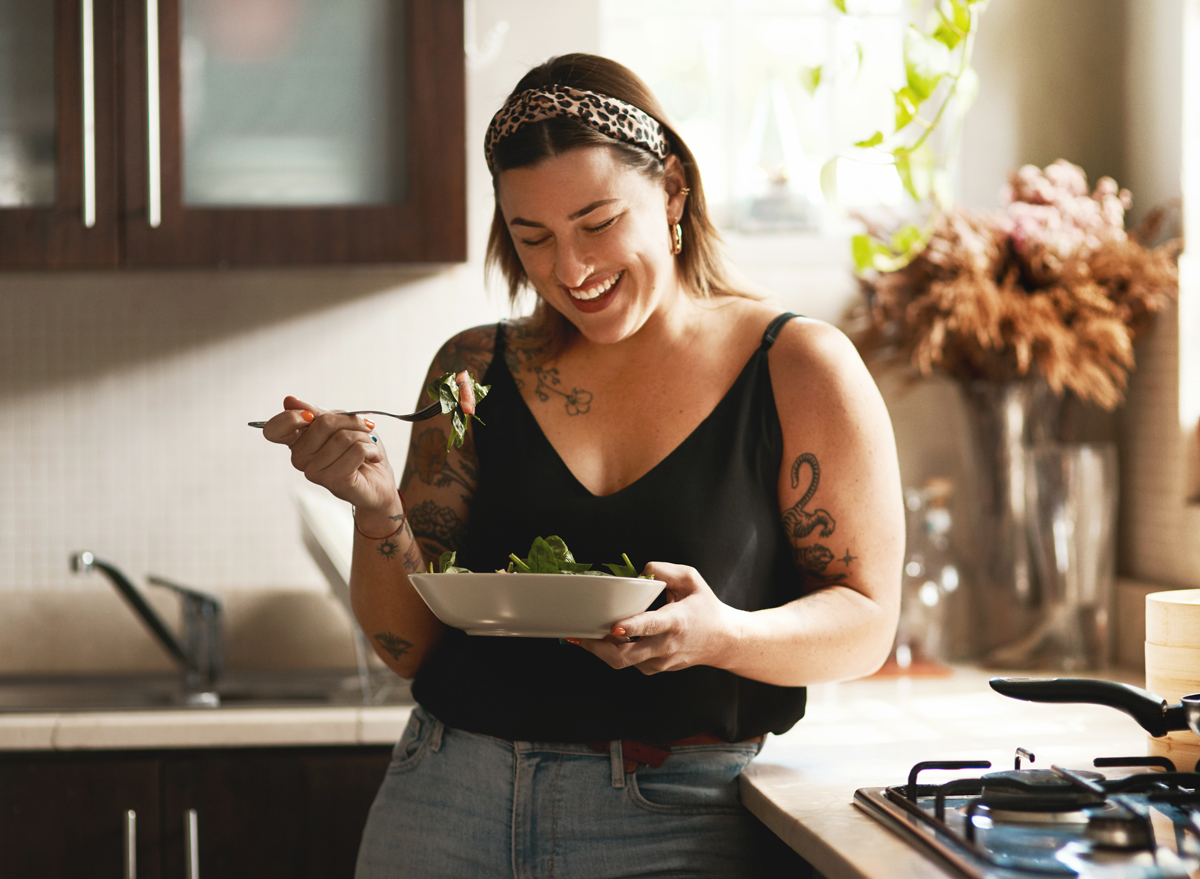
If you’re trying to lose weight, you likely know you need to reduce your caloric intake. The problem is, it’s hard to do because many of us feel hungry and our cravings kick in when we start cutting back. One of the main reasons individuals can’t decrease their calorie intake is because of their hunger.
Feeling full and satisfied is essential for maintaining a healthy diet and preventing overeating. While it’s tempting to reach for processed, calorie-dense foods when hunger strikes, incorporating natural, nutrient-dense options into your meals and snacks will help you stay fuller for longer, help control swings in blood sugar, and can reduce risk for chronic diseases. In addition to choosing healthier foods and beverages, there are several other scientifically backed tips and tricks that help the brain tamp down your appetite and ramp up feelings of satisfaction.
Here are 10 great ways to help you feel full while eating less. Read on, and for more, don’t miss these 30 Low-Calorie Snacks That Are Filling & Tasty.
Implement intermittent fasting.
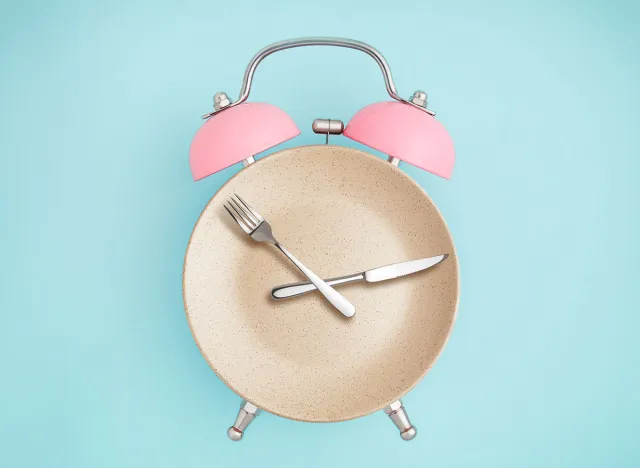
A great way to keep hunger at bay to help you succeed at cutting back calories is to try intermittent fasting. According to a review by the Harvard T.H. Chan School of Public Health, a review article of 40 studies found that intermittent fasting was effective for weight loss, with a typical loss of 7-11 pounds over 10 weeks.
However, it is still unclear that intermittent fasting is superior to other weight loss methods, I have seen many clients who have explained that when they follow a time-restricted eating pattern of eating during a 10-hour window and fasting for a 14-hour window helps them keep their hunger and appetite in check. Often, we mindlessly eat at night or at other times when we have no physiological hunger. When you try time-restricted intermittent fasting, you can help avoid mindlessly eating.
Limit the number of foods you eat at each meal and snack.
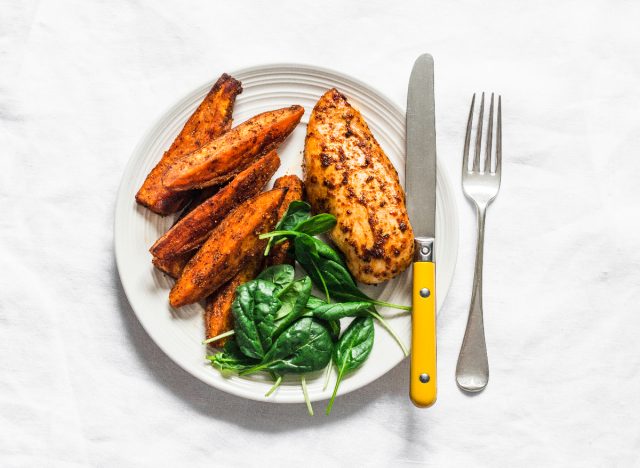
They say variety is the spice of life, but too much variety in your meals may be one reason why you’re consistently overeating. There’s a scientific reason why you’ll overconsume calories when you enjoy a holiday dinner, at a party, or when eating from a buffet—it’s called sensory-specific satiety. Sensory-specific satiety is a psychological phenomenon that plays a key role in limiting food intake. It refers to the decrease in the pleasure derived from consuming a particular type of food as we consume more of it.
Research published in the American Journal of Clinical Nutrition reported that both normal-weight and obese women are equally impacted by sensory-specific satiety. Limiting the number of different foods at a meal can help individuals feel more satisfied and potentially control their food intake. By reducing the number of different flavors and aromas on your plate, you’ll naturally feel satisfied sooner. This can lead to a greater sense of satisfaction with the meal, ultimately supporting healthier eating habits and portion control.
Skip high-fat, high-sugar, highly processed foods.
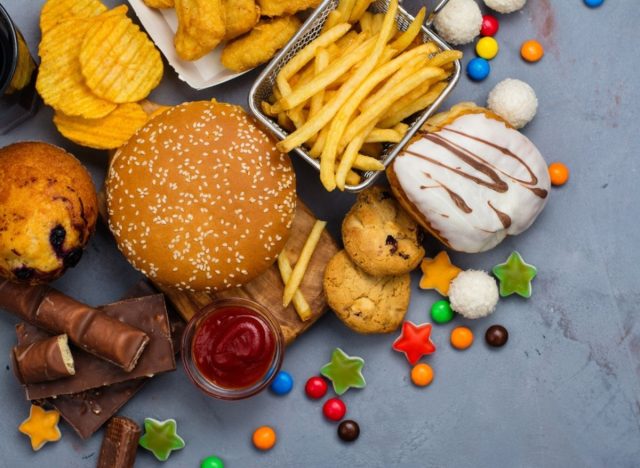
Food manufacturers have perfected the art of making delicious, crave-able foods that are digested quickly and make us want more and more. A review study published in Clinical Chemistry outlines how foods with specific combinations of ingredients, like sugar and refined carbohydrates, fat, and salt can trigger addictive-like behaviors. When we eat foods that have high glycemic loads (read: high in sugar and refined carbohydrates) it triggers a feel-good dopamine response in the brain. When the response diminishes, it makes us crave these foods more, despite not even having any physiological hunger.
According to one University of Michigan study published in PLOS ONE, the most addictive foods, the most addictive-type foods include chocolate, ice cream, French fries, pizza, cookies, chips, cake, buttered popcorn, cheeseburgers, muffins, breakfast cereal, and gummy candies. What these foods have in common is that they are all highly processed and have added fat or refined carbohydrates, the researchers write.
Sleep more.

Emerging research suggests that getting an adequate amount of sleep plays a crucial role in controlling hunger hormones and preventing overeating. One key study published in the British Journal of Nutrition reported that poor sleep resulted in increases in hunger hormones, resulting in participants reporting being hungry after poor sleep. This and other studies show that sleep deprivation leads to an increase in ghrelin, the hormone responsible for stimulating appetite, while decreasing levels of leptin, which signals fullness.
Prioritizing sufficient sleep, typically around 7-9 hours per night for adults, can help restore the balance of these hormones, making it easier to maintain a healthy weight and resist the temptation to overeat.
Eat more oats.
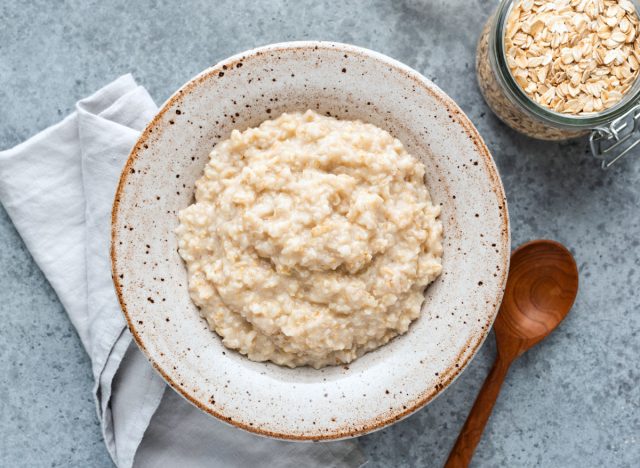
Starting your day with a bowl of oatmeal or refreshing overnight oats can help fuel your satisfaction. Oats are rich in soluble fiber, particularly beta-glucans, which have been extensively studied for their appetite-suppressing effects (not to mention their ability to lower harmful, LDL-cholesterol levels). One notable study published in the Journal of the American College of Nutrition demonstrated that consuming oatmeal increased feelings of fullness and reduced hunger compared to a low-fiber cereal, leading to fewer calories consumed later in the day.
This sustained feeling of fullness not only helps in controlling calorie intake but also supports better portion control and healthier eating habits. In addition to eating oats hot or cold, you can also incorporate them into smoothies, baked goods, and ground meats to increase feelings of fullness.
Snack on apples.
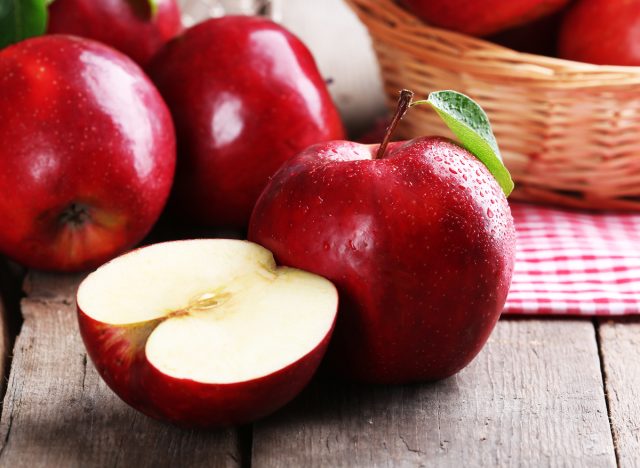
Apples are rich in the soluble fiber pectin and water, two components that make them a great pick to curb hunger and enhance satiety. A review article published in the Journal of the American College of Nutrition reported that apples can help induce weight loss through several mechanisms.
The pectin fiber in apples helps slow the digestion and absorption of apples to help enhance feelings of fullness. A medium apple has about 100 calories and 4.5 grams of fiber making them a convenient and nutritious choice for those aiming to reduce overall calorie consumption.
Bring on the beans and legumes.
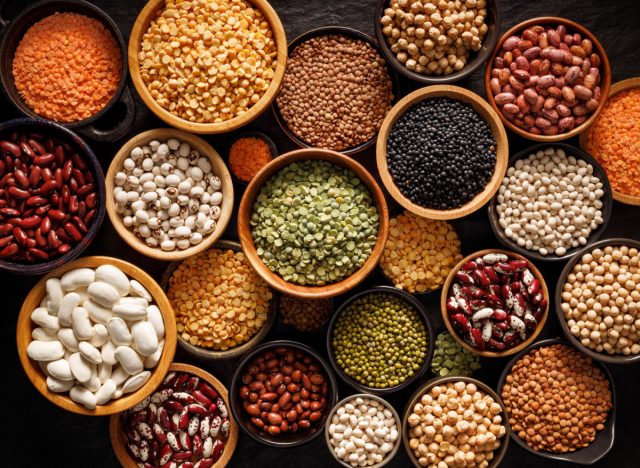
Beans, peas, lentils, and chickpeas are excellent sources of plant-based protein, fiber, slow-to-digest carbohydrates, and beneficial antioxidants. Research published in Advances in Nutrition reveals that the high fiber counts and relatively low calories make these foods a great addition to keep you full while eating fewer calories.
Studies also show that individuals report feeling fuller after eating legumes, compared to meals without them. Legumes help keep blood sugar levels stable, which in turn, helps keep you satisfied longer. Enjoy beans and legumes in salads, soups, and stews and you can even mash them and add them to baked goods.
Crack more eggs.
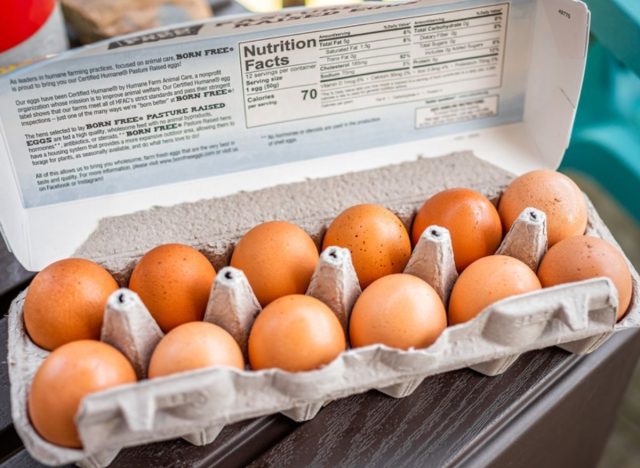
Eggs are considered the gold standard for high-quality protein and the protein in eggs can help you feel fuller for longer. Studies with eggs versus cereal or bagel breakfasts have revealed that an egg-based breakfast increases feelings of fullness and is more effective at reducing hunger and enhancing fullness.
One study published in the International Journal of Environmental Research and Public Health reported that study participants ate fewer calories at lunch and reported feeling fuller longer when eating an egg-based breakfast versus an equal calorie breakfast of cereal, milk, and juice. While eggs at breakfast are a great way to start your day, keeping hard-boiled eggs on hand is a nutritious between-meal snack that may help ensure you keep overall calories in check.
Have water or soup before meals.
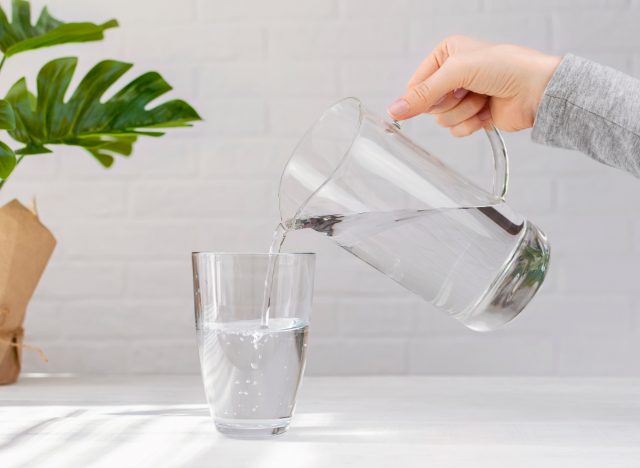
Another effective strategy to fool yourself into being full while eating fewer calories is to drink 16 ounces of water or have a bowl of broth or vegetable soup prior to your lunch or dinner. A study published in the journal Obesity reported that those who drank about two cups of water before their meals and followed a calorie-controlled diet lost about 5 pounds more during the 12-week study, compared to dieters who didn’t drink water before their meals.
What’s more, a study from Penn State University revealed that starting your meals with soup resulted in consuming about 20 percent fewer calories during the meal. Drinking energy-poor water or enjoying low-calorie soups before will help keep you satisfied due to the increased volume of the meal with the addition of water or soup.
Downsize plates and bowls.
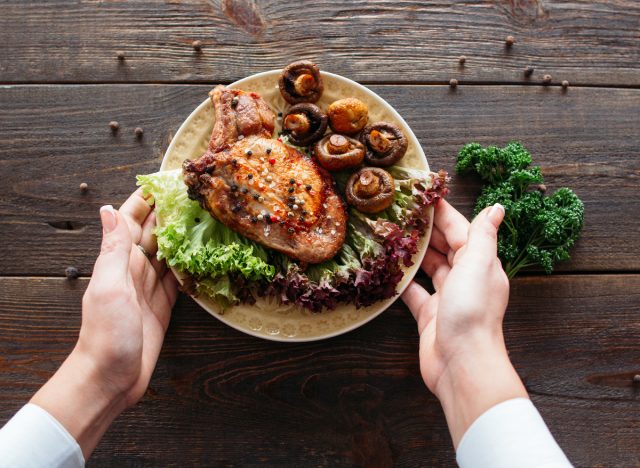
We eat with our eyes, and if you grew up with a “clean your plate” mentality, if your tableware is oversized, chances are your food portions are too, thanks to the Delboeuf Illusion, the phenomenon that causes individuals to overeat when food is served on or in larger plates and bowls, according to research published in the Journal of Consumer Research. Simply downsizing your tableware could help you serve more appropriate—and satisfying—meals and snacks while helping you reduce your daily calories.
Incorporating these foods and other changes into your daily diet can help you achieve and maintain feelings of fullness, making it easier to control your calorie intake and support your overall health and weight management goals. Remember that a balanced diet, along with portion control and mindful eating, is key to achieving lasting satisfaction and well-being.
- Source: https://www.hsph.harvard.edu/nutritionsource/healthy-weight/diet-reviews/intermittent-fasting/
- Source: https://pubmed.ncbi.nlm.nih.gov/15447886/
- Source: https://pubmed.ncbi.nlm.nih.gov/29158252/
- Source: https://www.ncbi.nlm.nih.gov/pmc/articles/PMC4334652/
- Source: https://pubmed.ncbi.nlm.nih.gov/22682471/
- Source: https://pubmed.ncbi.nlm.nih.gov/26273900/
- Source: https://pubmed.ncbi.nlm.nih.gov/29630462/
- Source: https://www.ncbi.nlm.nih.gov/pmc/articles/PMC3042778/
- Source: https://www.mdpi.com/1660-4601/17/15/5583
- Source: https://pubmed.ncbi.nlm.nih.gov/19661958/
- Source: https://www.psu.edu/news/health-and-human-development/story/eating-soup-will-help-cut-calories-meal/
- Source: https://academic.oup.com/jcr/article-abstract/39/2/215/1795747









